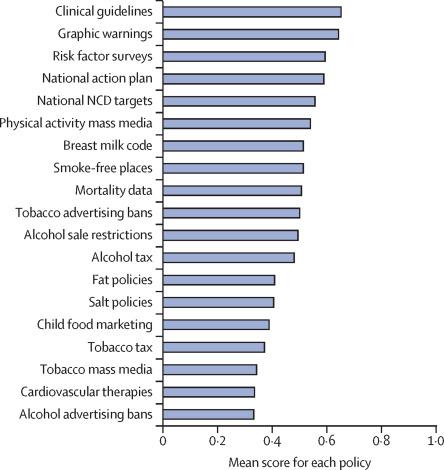The Lancet Global Health ( IF 34.3 ) Pub Date : 2019-12-05 , DOI: 10.1016/s2214-109x(19)30446-2 Luke N Allen 1 , Brian D Nicholson 1 , Beatrice Y T Yeung 1 , Francisco Goiana-da-Silva 2

|
Background
Most countries have endorsed WHO non-communicable disease (NCD) best buy policies, but we know very little about global implementation patterns and about the geopolitical factors affecting implementation. We aimed to assess global implementation based on analysis of multiple geopolitical datasets.
Methods
We used the 2015 and 2017 WHO NCD progress monitor reports to calculate aggregate implementation scores for 151 countries, based on their implementation of 18 WHO-recommended NCD policies. We ranked all countries and used descriptive statistics to analyse global trends. We used linear regression to assess the associations between policy implementation and World Bank geographic region, risk of premature NCD mortality, percentage of all deaths caused by NCDs, World Bank income group, human capital index, democracy index, and tax burden.
Findings
In 2017, the mean NCD policy implementation score was 49·3% (SD 18·4%). Costa Rica and Iran had the joint-highest implementation scores (86·1% of all WHO-recommended policies). Scores were lowest in Haiti and South Sudan (5·5%). Between 2015 and 2017, aggregate implementation scores rose in 109 countries and regressed in 32 countries. Mean implementation rose for all of the 18 policies except for those targeting alcohol and physical activity. The most commonly implemented policies were clinical guidelines, graphic warnings on tobacco packaging, and NCD risk factor surveys. Our multiple linear regression model explained 61·1% of the variance in 2017 aggregate scores (p<0·0001), but we found evidence of a high degree of collinearity between the explanatory variables.
Interpretation
Implementation of WHO-recommended NCD policies is increasing over time. On average, countries implemented just under half of the NCD policies recommended by WHO in 2017. Nutrition-related policies saw gains, while those related to alcohol and physical activity were the most likely to have been dropped. Aggregate implementation scores tended to be highest in high-income countries that invest in health care and education.
Funding
National Institute for Health Research, Imperial College London, University of Oxford.
中文翻译:

实施非传染性疾病政策:对151个国家的地缘政治分析。
背景
大多数国家都认可世卫组织的非传染性疾病最佳购买政策,但我们对全球实施模式以及影响实施的地缘政治因素知之甚少。我们旨在基于对多个地缘政治数据集的分析来评估全球实施情况。
方法
我们根据2015年和2017年WHO非传染性疾病进展监测报告,根据151个国家实施WHO推荐的18种非传染性疾病政策,计算了总的实施得分。我们对所有国家进行了排名,并使用描述性统计数据分析了全球趋势。我们使用线性回归来评估政策实施与世界银行地理区域,非传染性疾病过早死亡的风险,非传染性疾病导致的所有死亡百分比,世界银行收入群体,人力资本指数,民主指数和税收负担之间的关联。
发现
2017年,非传染性疾病执行政策的平均得分为49·3%(标准差18·4%)。哥斯达黎加和伊朗的执行评分最高(在世卫组织推荐的所有政策中占86·1%)。在海地和南苏丹,分数最低(5·5%)。在2015年至2017年之间,总实施得分在109个国家/地区上升,并在32个国家/地区下降。除针对酒精和体育锻炼的18项政策外,其他18项政策的平均执行率均有所提高。最常用的政策是临床指南,烟草包装上的图形警告和NCD危险因素调查。我们的多元线性回归模型解释了2017年总分中方差的61·1%(p <0·0001),但我们发现了解释变量之间高度共线性的证据。
解释
随着时间的推移,世卫组织推荐的非传染性疾病政策的实施正在增加。平均而言,国家执行了世卫组织2017年建议的非传染性疾病政策的将近一半。与营养有关的政策有所收获,而与酒精和身体活动有关的政策则最有可能被取消。在医疗保健和教育方面进行投资的高收入国家中,总体实施得分往往最高。
资金
牛津大学伦敦帝国学院国家卫生研究所。



























 京公网安备 11010802027423号
京公网安备 11010802027423号